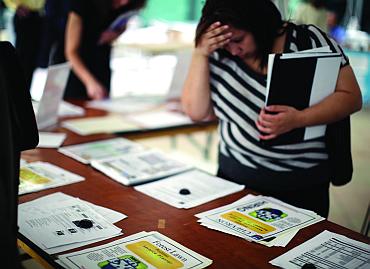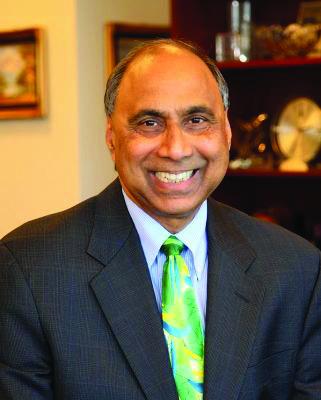Photographs: Lucy Nicholson/Reuters Frank Islam
During the roughly 67 hours Obama was in India--the longest time he spent in a foreign country after becoming President--we got a glimpse of what the future holds for that relationship: A strong alliance of two powerful nations, at the heart of which are shared economic prosperity and common strategic interests. On his part, the President proved during the trip that he really meant it, when he said he saw India as one of America's central allies.

It is safe to say that the President has accomplished almost everything he set out to, and has, in the process, elevated the relationship to a whole new terrain. Among the primary objectives he wanted to achieve from the trip were concluding substantive business deals that would create jobs at home in the US, and strengthening the strategic partnership.
He also had a small personal matter to attend to, as well: Allaying the concerns that some Indians had about a few aspects of his policy. Erasing these concerns was important, because perception matters, especially for heads of State. Some in India were worried that Obama would want to 'interfere' in the Kashmir issue, or at least put pressure on India to solve the problem, in a departure from the George W Bush administration's stand on the issue.
Second, some in the host country also though his position on Pakistan was ambivalent. The President addressed both concerns to the satisfaction of most Indians. Even on the outsourcing issue, the third area of anxiety for many Indians, Obama said the right things.
From the perspective of India, one of the, or perhaps, the high point of the President's visit was his declaration of support for India's entry into the United Nations Security Council as a permanent member. The President's much-desired endorsement came in a speech before the joint session of India's parliament, and it received huge applause from Prime Minister Singh and his Lok Sabha and Rajya Sabha colleagues. The speech, in which he stood up for free trade, free markets and free society, was one of his best in recent times.
Another significant announcement that endeared Obama to the Indian public was the removal of some Indian firms and entities from the so-called US 'Entities List,' which had made sale of high technology--which has both commercial and military applications--to those placed on the list difficult. The entities that were on the list included subordinates of two elite Indian government-funded research organisations, the Defense Research and Development Organization, which is tasked with developing technology for military use, and the Indian Space Research Organisation, which spearheads space research in India.
Some in the US Congress have already said the measure will go a long way in advancing military-to-military ties between the two countries.
Both the UNSC endorsement and the lifting of restrictions on dual-use technology were clearly noteworthy advances in US position. Even President George W Bush, widely considered a friend of the India because of making the historic civil nuclear deal with India a reality, had not gone enough distance on these two issues.
One aspect of the visit that was of great importance to most of us in the US was trade and economic cooperation. I have to admit that, as a business leader, and as someone serving on the advisory committee of the Export-Import Bank of the United States, and also on the Industry Trade Advisory Committee on Small and Minority Business, this was the area I was paying the closest attention to.
'The US needs India to hels its sagging economy'
Image: Frank IslamHe announced trade transactions worth about $ 15 billion, of which $ 9.5 billion was deals for exporting US goods to India, which could create as many as 53,670 jobs in the US. The goods American firms will sell to India include heavy military transport aircraft, light combat aircraft engines, commercial aircraft, gas and steam turbine, mining equipment, tunneling machines and long-range antenna system, among others.

In an economy as big as that of the US, $ 9.5 billion might not be huge, but importance of the current deals go beyond the immediate impact. What they reveal is the potentials that hold for both countries in trade and commerce.
Because of the Great Recession, the US job market has been in dire straits for three years. It is a no-brainer that the US needs the emerging overseas markets to put its sagging economy back on track.
As President Obama said in Mumbai, 'no country represents that promise of a strong, vibrant commercial relationship more acutely than India.' With its huge size and near double-digit economic growth rate, the Indian economy, some predict, will be the second largest in the world--after China's--in another three decades.
In the next five years, India is looking to invest as much as $ 1 trillion on infrastructure development. And Prime Minister Singh himself has pointed out that the country needs new and private investments for undertaking many of the mammoth infrastructure projects. The US could help with a substantial chunk of the much-needed foreign direct investment, as well as knowhow. In return, the US economy could clearly benefit from India's expansion, in terms of new jobs and yield on its investments.
A key partner in this massive infrastructure enterprise would be the Ex-Im Bank, the official credit agency of the US that assists in financing the export of US goods and services to global markets. In fact, one of the major transactions announced November 6 was a $ 5 billion memorandum of understanding signed between Ex-Im Bank Chairman Fred P Hochberg, who was part of President Obama's high-profile business delegation, and Anil Ambani, chairman, Reliance Power Ltd. As part of the memorandum of understanding, the Ex-Im would support Reliance Power's purchase of 8,000 megawatts of gas-fired power generating machines, as well as 900 megawatts of US-made solar and wind power-generating equipment.
Chairman Hochberg predicted, after the signing, that given India's commitment to give electricity to all corners of the country within in the next two years, "the demand for US technology and equipment will grow." And he noted, "America makes what India needs, and Ex-Im is ensuring that US companies can seize these new export opportunities."
With a big supporter of India in Hochberg at the helm, I am sure we will see a lot more involvement of Ex-Im Bank in the country. As an Indian American, I am looking forward to giving full support to the chairman's efforts, in my capacity as a member of the advisory committee.
Even though US exports to India had quadrupled to more than $16 billion from 2002 to last year, it is still far below the potential. As Obama said in Mumbai, America exports more goods to the Netherlands, a country the size of Mumbai, than to India. While in India, the President himself kicked off efforts to take the bilateral trade relations to the next level. My hope is both sides would use the right atmospherics provided by the presidential visit to increase the volume of two-way commerce drastically. I have no doubt that trade and commerce can be, along with the strategic partnership, a defining aspect of the US-India bilateral relationship. As Ron Summers, president, US-India Business Council, said, the US-India commercial relationship has achieved a level of depth and maturity where we stand together to create a win-win situation for both countries.
Frank Islam is chairman and chief executive officer of FI Investment Group, based in the metropolitan Washington area. He is a member of the advisory committee of the US Export-Import Bank and the Department of Commerce Industry Trade Advisory Committee.



article